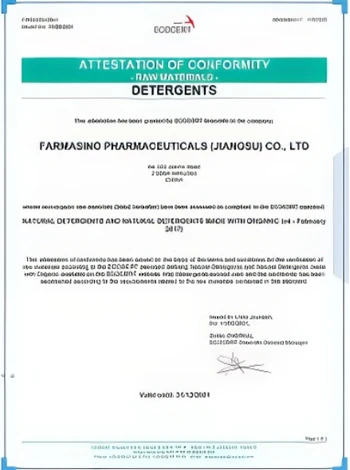



chemicals used for wastewater treatment
Wastewater treatment is a crucial process in maintaining environmental health and public safety. It involves the removal of contaminants from wastewater, primarily from household sewage and industrial effluents, before it is released back into the environment. One of the key components of wastewater treatment is the use of various chemicals, which play a significant role in ensuring the effectiveness of this process.
Chemical agents are used at different stages of wastewater treatment, primarily in coagulation, flocculation, disinfection, and pH adjustment. Coagulation is the first step, where chemicals such as alum (aluminum sulfate) or ferric chloride are added to the wastewater. These coagulants cause fine particles suspended in the water to aggregate into larger clumps, or flocs. This aggregation facilitates the removal of pollutants from the water during subsequent processes.
After coagulation, flocculation follows. In this stage, gentle mixing of the water is performed to encourage the formation of larger flocs, which are easier to remove. Chemicals such as polymeric flocculants are often used to enhance the flocculation process, improving the capture of suspended particles.
chemicals used for wastewater treatment

Disinfection is another critical stage in wastewater treatment, ensuring that harmful microorganisms are effectively eliminated before the water is discharged. Common disinfectants include chlorine, chloramine, and ozone. Chlorine is widely used due to its effectiveness and cost-efficiency; however, its use must be carefully monitored to prevent the formation of harmful byproducts. Emerging alternatives like ultraviolet (UV) light and advanced oxidation processes are gaining popularity, as they reduce the risks associated with chemical disinfection.
Furthermore, pH adjustment is vital for optimal treatment performance. The pH of wastewater can significantly affect the solubility and mobility of various contaminants. To correct pH levels, chemicals such as sulfuric acid or sodium hydroxide may be added, ensuring the water is within a suitable range for efficient treatment.
In conclusion, chemicals used in wastewater treatment are integral to the removal of contaminants and ensuring water safety. Their roles in coagulation, flocculation, disinfection, and pH control are essential for effective wastewater management. As environmental regulations become more stringent, ongoing research and innovation are essential to develop more efficient and environmentally friendly chemical treatments for wastewater, ultimately leading to a cleaner ecosystem and healthier communities.
-
Why Sodium Persulfate Is Everywhere NowNewsJul.07,2025
-
Why Polyacrylamide Is in High DemandNewsJul.07,2025
-
Understanding Paint Chemicals and Their ApplicationsNewsJul.07,2025
-
Smart Use Of Mining ChemicalsNewsJul.07,2025
-
Practical Uses of Potassium MonopersulfateNewsJul.07,2025
-
Agrochemicals In Real FarmingNewsJul.07,2025
-
Sodium Chlorite Hot UsesNewsJul.01,2025










